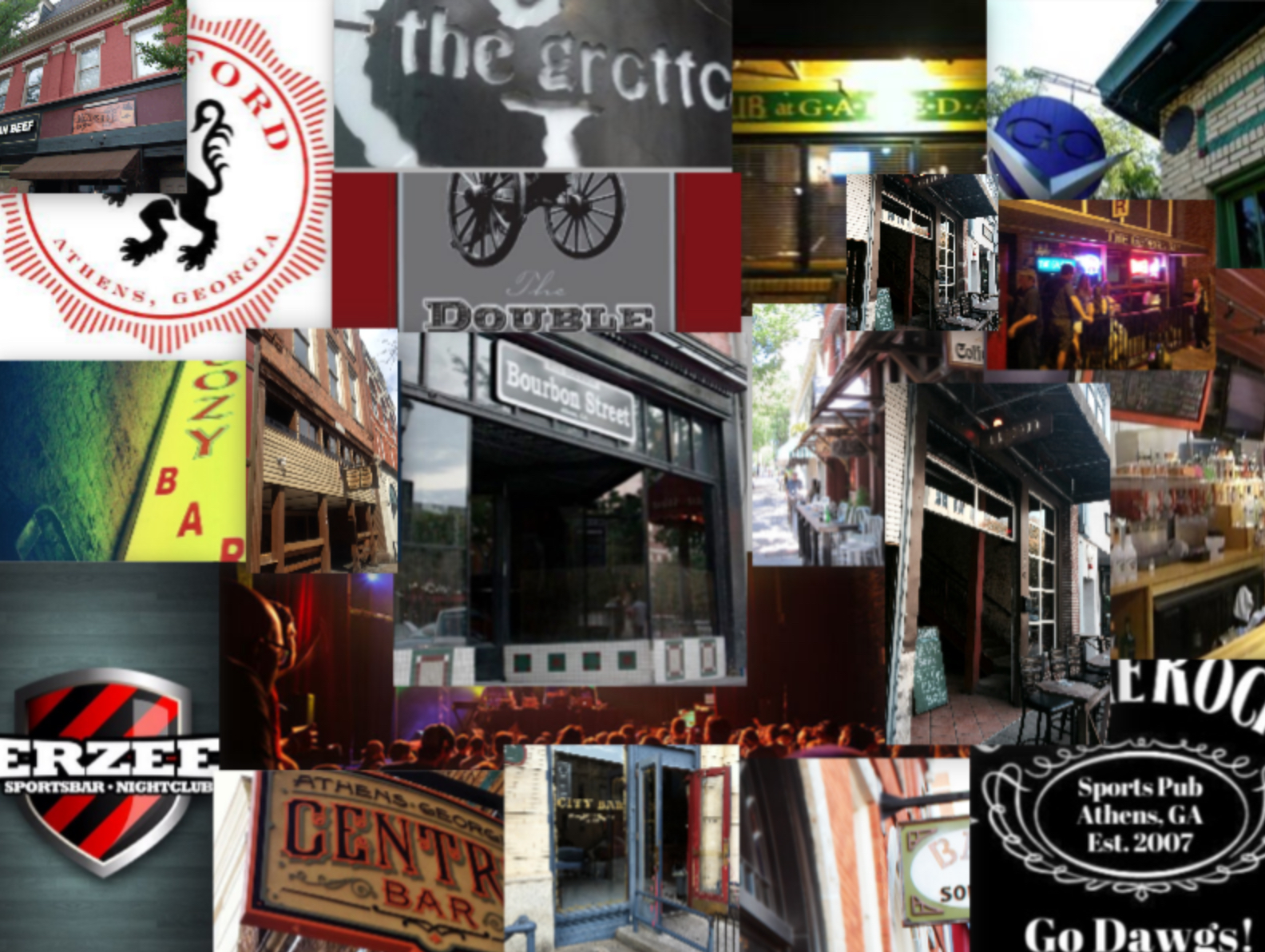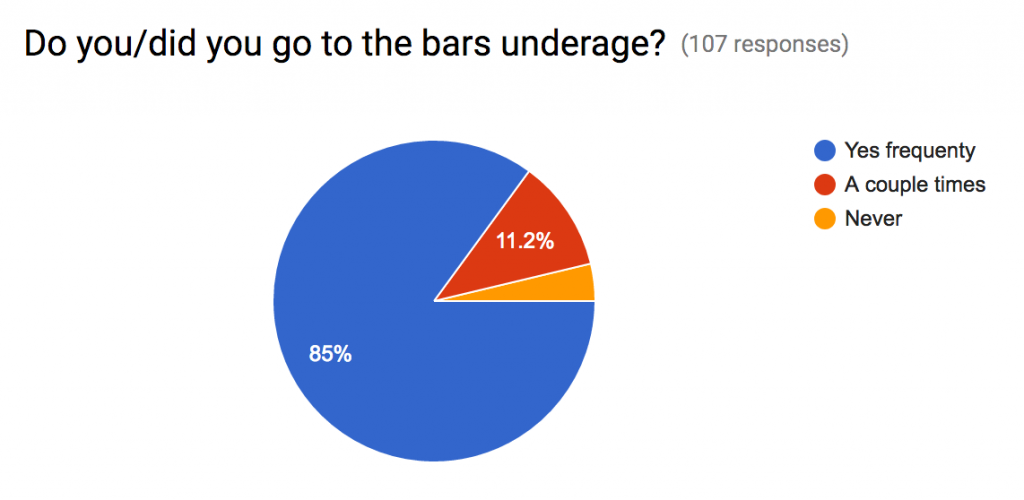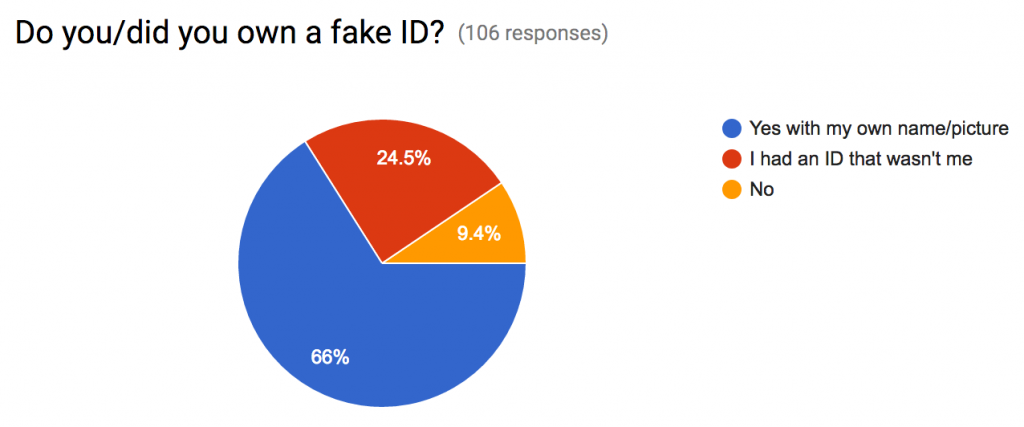It’s a drunk dream: leaving one bar to walk 10 yards down the street just to enter another bar and then again and again over 80 times. That can be a reality in downtown Athens, Georgia, a college town turned bar-breeding ground with a record number of bars in one single square mile.
People come from all around the country to hop from tab to tab in this bustling scene. The school and city seem to appreciate the tourism but the drinks don’t come cheap.
A GROWING BAR SCENE OVER THE DECADES
The modern bar scene in Athens started out with The Georgia Bar coming to East Clayton Street in 1986 according to the Grady Newswatch. Following its opening, more and more spots started popping up downtown in attempts to breathe life in a then desolate part of Athens.
A longtime downtown bar owner who wishes to remain anonymous stated: “Bars revitalized downtown, we changed it, and we brought the money back in downtown.”
Click on the following image to see more detail about the current bars of Athens.
The bar scene of Athens now includes watering holes for locals and University of Georgia students alike, historically bringing business to the downtown area but also causing regulatory problems for law officials and bar owners.
These issues center on overcrowding, over intoxication, underpayment, and especially underage drinking.
DRINKING UNDERAGE
Underage drinking is a national problem and is especially prevalent in Athens.
One problem regards the high number of people who are under 21 living in the city. UGA reports 5,256 freshmen and 6,396 sophomores in 2016 in addition to the portion of underage upperclassmen. There are also six high schools in the Athens-Clarke County area.
The Center for Disease Control and Prevention reported in October 2016: “People aged 12 to 20 years drink 11 percent of all alcohol consumed in the United States. More than 90 percent of this alcohol is consumed in the form of binge drinks.”
The number of underage residents of Athens raises the likelihood of underage drinking in the city but legally these under 21-year olds should still not be allowed in the bars. Here enters the problems of beating the law.
FAKING IT
Fake methods of identification are a popular sight with college students, with a 2002 study from the US National Library of Medicine finding that 32.2 percent of second-semester sophomores at a “large Midwestern university” possessed a fake ID.
The use of “fakes” has been a continuous occurrence over time at the University of Georgia even before that study.
Rebecca McCarthy reported on Athens for the Atlanta Journal-Constitution in 1997 stating, “Dimly lit entrances crowded with customers aren’t easy places to distinguish between fake or borrowed IDs and legitimate documents. And the quality of fake IDs is getting better.”
With the study being 15 years old and that report being 20 years old, it is easy to understand how situations have worsened.
A NEW SURVEYING
I conducted a survey through Facebook in April 2017 of over 100 UGA students asking questions to see modern habits with students and the downtown bars.
Roughly 70 percent of the respondents were under 21, with 20 percent being actually 21 and the remaining 10 percent being 22 or older.
A large majority (85 percent) reported that they frequently go to or went to the bars underage.
Results showed 66 percent have owned a fake ID with their own name and picture and an additional 24.5 percent owned an over-21 ID that was not their own identity. Only 9.4 percent of respondents never owned any sort of false identification.
POLICIES OF ATHENS-CLARKE COUNTY
Athens Clarke-County has recently changed their policies on underage drinking tied to possession charges due to the use of fake identifications to purchase alcohol and get into bars.
In July 2015, officials decided to no longer arrest underage kids possessing alcohol. Instead, according to Lee Shearer of the Athens Banner-Herald, cops now just give underage citations rather than bringing students into custody.
Shearer also wrote that the change “calls for citations rather than custodial arrests when people under 21 are charged with misrepresenting their ages or identities — fake IDs.”
Public intoxication, though, as well as driving under the influence is still punishable by arrest according to the article. These policies changes are specifically by the Athens-Clarke County officials, not those of the UGA Police Department.
The following representation illustrates how alcohol is more of an ACC problem, with numbers coming from both the ACC and UGA Police Departments’ annual reports.
Even with the departmental policy changes, underage drinking and fakes were still very present in Athens.
The Georgia Department of Revenue Alcohol and Tobacco took action in February of 2016, according to a report from The Red & Black. The article states, “11 citations were issued to individuals and administrative citations will be issued to any businesses that were found out of compliance with the state’s alcohol laws.”
MICHAEL’S LAW
On top of the GDR’s raids, another attempt at restricting underage presence in the bars of Athens comes with the newly created Michael’s Law in Georgia.
Michael’s Law started after Michael Gatto passed away his freshman year at Georgia Southern University after being beat by a bar employee, according to WGCL-TV Atlanta.
Gatto was underage as was the employee. The bar they were in did not have liquor liability insurance, as Georgia law did not require bars to have said insurance.
Gatto’s parents wanted to change the policies in the name of their son.
According to the Michael’s Law website, the regulation creates “a minimum insurance requirement, at the State level, in order for businesses to obtain an alcohol license” and makes it so “servers can be 18, but only if the establishment is a restaurant. A bartender, one who actually pours the drinks, must be 21.”
For Athens, this law holds a great deal of weight with the high number of bars in the city.
Students at UGA, both over and under the legal age, are attractive employees for bar owners because of their social connections; underage students are even more advantageous for bar employers because they can work for three or four years while they are in college.
Warren Southall, owner of downtown bar Boar’s Head described to reporters at The Red & Black in June 2016 the struggles that come with Michael’s Law.
“The frustrating part of this law is sometimes you have stellar waitresses or bartenders,” Southall said. “I find it hard that I can’t call up a 20-year-old who’s been working with me for two years, and she won’t be able to pick up a shift.”
The previously quoted anonymous downtown bar owner questioned the law, asking: “Can you tell someone that they can’t serve alcohol?”
He went on to point out that underage kids “can serve alcohol at Pauley’s [a downtown Athens restaurant] but can’t serve alcohol at a bar right next door because only one place serves crepes.”
These bar owners are not the only ones having trouble accepting the new law. Michael’s Law, known formally as Georgia House Bill 152, is currently involved in a lawsuit brought on by three underage workers who were let go from their jobs at bars according to a December 2016 report from The Red & Black.
Athens-based attorney Kevin Epps told The Red & Black that the “law violates the Equal Protection Clause under the United States Constitution and the Constitution of the State of Georgia” and that it is “discriminating against people under the age of 21 and these bar establishments.”
The lawsuit was filed in August 2016, only over a month after the law was enacted on July 1 of that year.
Since then, underage servers are still present in the bars of downtown Athens.
THE IMPACT ON SERVERS
The idea of Michael’s Law, whether in effect or not, on top of the raids has added even more pressure for Athens bartenders.
Owen McDaniel, a 20-year-old UGA sophomore and employee at Double Barrel on Broad Street, spoke about how tricky it can be working at a bar downtown.
McDaniel explained that as a door worker, you are “instructed to not let any tape-overs [IDs] or anything like that where it’s obvious that the person isn’t 21, but if the picture matches the person and the date of birth and it’s not expired then it’s fair game.”
The advertising student also talked about how he was affected by the policies of Michael’s Law.
“There was talk about all the under-21 employees being fired but I guess because of that, they did take certain measures to protect us,” McDaniel said, “by putting the above 21 people at the door… where people can see that you don’t exactly look 21.”
Additionally, Danielle Altman, a 22-year-old Johns Creek native who worked at Flannigan’s on Clayton Street said that at the time of Michael’s Law starting, “they put everyone on hiatus basically when it was first passed because they didn’t want to get in trouble with the law.”
Altman, who now works at Buddha Bar on Broad Street, does not see the difference between of-age or underage bartenders as “you are trained the same way so there shouldn’t be a difference.”
SLOWING THE BAR SCENE
The newest action taken towards the situation is no longer just centered on underage serving but the downtown scene in general. It is a one-year moratorium, a suspension of development, on the bars, restaurants, and buildings created by the Athens-Clarke County Commission.
“Basically, we’re trying to hold the status quo until we can catch our breaths…we have, in my opinion, an unhealthy situation downtown of crowding, excessive drinking, lots of bodies packed into one room than what is meant to go into,” explained Mayor Nancy Denson in an interview with The Red & Black.
The moratorium is meant to slow the overdevelopment of the downtown area as most businesses and living situations there have rapidly appeared in the past 30 years.
The University of Georgia supports the new act with an article from Flagpole Magazine writing “UGA President Jere Morehead welcomed and applauded the moratorium on new bars and apartments enacted by the local government.”
The moratorium is a new idea for the Athens-Clarke County officials and is something unprecedented in the downtown area.
Brad Griffin, the Planning Director for the Athens-Clarke County Planning Department, explained the idea: “I think it something more for studying purposes and that is something worth being studied.”
The next question, though, becomes will all of these actions make a difference. If Michael’s Law is found constitutional, how will the situation of downtown change?
It is safe to say, if the moratorium, GDR raids and Michael’s Law are all compiled together, the notorious Athens bar scene will never be the same for underage customers, of age residents and bar owners alike.





